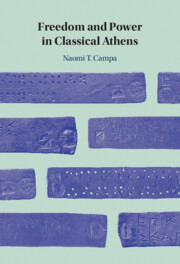
-
Select format
-
- Publisher:
- Cambridge University Press
- Publication date:
- April 2024
- April 2024
- ISBN:
- 9781009221443
- 9781009221436
- Creative Commons:
-
This content is Open Access and distributed under the terms of the Creative Commons Attribution licence CC-BY-NC 4.0.
https://creativecommons.org/creativelicenses - Dimensions:
- (229 x 152 mm)
- Weight & Pages:
- 0.46kg, 212 Pages
- Dimensions:
- Weight & Pages:
Open AccessYou have digital access to this book
Book description
Athenian democracy was distinguished from other ancient constitutions by its emphasis on freedom. This was understood, Naomi T. Campa argues, as being able to do 'whatever one wished,' a widely attested phrase. Citizen agency and power constituted the core of democratic ideology and institutions. Rather than create anarchy, as ancient critics claimed, positive freedom underpinned a system that ideally protected both the individual and the collective. Even freedom, however, can be dangerous. The notion of citizen autonomy both empowered and oppressed individuals within a democratic hierarchy. These topics strike at the heart of democracies ancient and modern, from the discursive principles that structure political procedures to the citizen's navigation between the limitations of law and expression of individual will to the status of noncitizens within a state. This title is part of the Flip it Open Programme and may also be available Open Access. Check our website Cambridge Core for details.
Reviews
‘Advanced students and academics interested in ancient Greek political theory are the primary audience for this book. … Recommended.’
R. T. Ingoglia Source: Choice
‘… provides a bold and fresh perspective on two of the oldest concepts in the history of political thought. 'Freedom and Power' represents an enormously important contribution and is a must-read for anyone interested in ancient Athenian history and political thought and the history of freedom more generally.’
Avshalom M. Schwartz Source: The Review of Politics
‘Best for graduate collections in military history, cultural studies, and Caribbean studies. … Recommended.’
R. Berleant-Schiller Source: Choice
Contents
Full book PDF-
Freedom and Power in Classical Athens
pp i-ii -
-
- You have access
- Open access
- HTML
- Export citation
-
-
Freedom and Power in Classical Athens - Title page
pp iii-iii -
-
- You have access
- Open access
- HTML
- Export citation
-
-
Copyright page
pp iv-iv -
-
- You have access
- Open access
- HTML
- Export citation
-
-
Dedication
pp v-vi -
-
- You have access
- Open access
- HTML
- Export citation
-
-
Contents
pp vii-viii -
-
- You have access
- Open access
- HTML
- Export citation
-
-
Acknowledgments
pp ix-xi -
-
- You have access
- Open access
- HTML
- Export citation
-
-
Conventions and Abbreviations
pp xii-xiv -
-
- You have access
- Open access
- HTML
- Export citation
-
-
Chapter 1 - Introduction
pp 1-17 - Freedom, Power, and Athenian Democracy
-
-
- You have access
- Open access
- HTML
- Export citation
-
-
Chapter 2 - Democratic Eleutheria as Positive Freedom
pp 18-55 -
-
- You have access
- Open access
- HTML
- Export citation
-
-
Chapter 3 - Oratorical Ambiguity
pp 56-87 -
-
- You have access
- Open access
- HTML
- Export citation
-
-
Chapter 4 - Power and the Citizen
pp 88-135 -
-
- You have access
- Open access
- HTML
- Export citation
-
-
Chapter 5 - The Powerless and Unfree
pp 136-165 - A Case Study
-
-
- You have access
- Open access
- HTML
- Export citation
-
-
Chapter 6 - Conclusion
pp 166-174 - The Reach of Freedom
-
-
- You have access
- Open access
- HTML
- Export citation
-
-
Bibliography
pp 175-188 -
-
- You have access
- Open access
- HTML
- Export citation
-
-
Index Locorum
pp 189-191 -
-
- You have access
- Open access
- HTML
- Export citation
-
-
General Index
pp 192-198 -
-
- You have access
- Open access
- HTML
- Export citation
-
Metrics
Full text views
Full text views help Loading metrics...
Loading metrics...
* Views captured on Cambridge Core between #date#. This data will be updated every 24 hours.
Usage data cannot currently be displayed.
Accessibility standard: WCAG 2.1 AA
Why this information is here
This section outlines the accessibility features of this content - including support for screen readers, full keyboard navigation and high-contrast display options. This may not be relevant for you.
Accessibility Information
The PDF of this book complies with version 2.1 of the Web Content Accessibility Guidelines (WCAG), covering newer accessibility requirements and improved user experiences and achieves the intermediate (AA) level of WCAG compliance, covering a wider range of accessibility requirements.
Content Navigation
Table of contents navigation
Allows you to navigate directly to chapters, sections, or non‐text items through a linked table of contents, reducing the need for extensive scrolling.
Index navigation
Provides an interactive index, letting you go straight to where a term or subject appears in the text without manual searching.
Reading Order and Textual Equivalents
Single logical reading order
You will encounter all content (including footnotes, captions, etc.) in a clear, sequential flow, making it easier to follow with assistive tools like screen readers.
Visual Accessibility
Use of colour is not sole means of conveying information
You will still understand key ideas or prompts without relying solely on colour, which is especially helpful if you have colour vision deficiencies.
Structural and Technical Features
ARIA roles provided
You gain clarity from ARIA (Accessible Rich Internet Applications) roles and attributes, as they help assistive technologies interpret how each part of the content functions.


